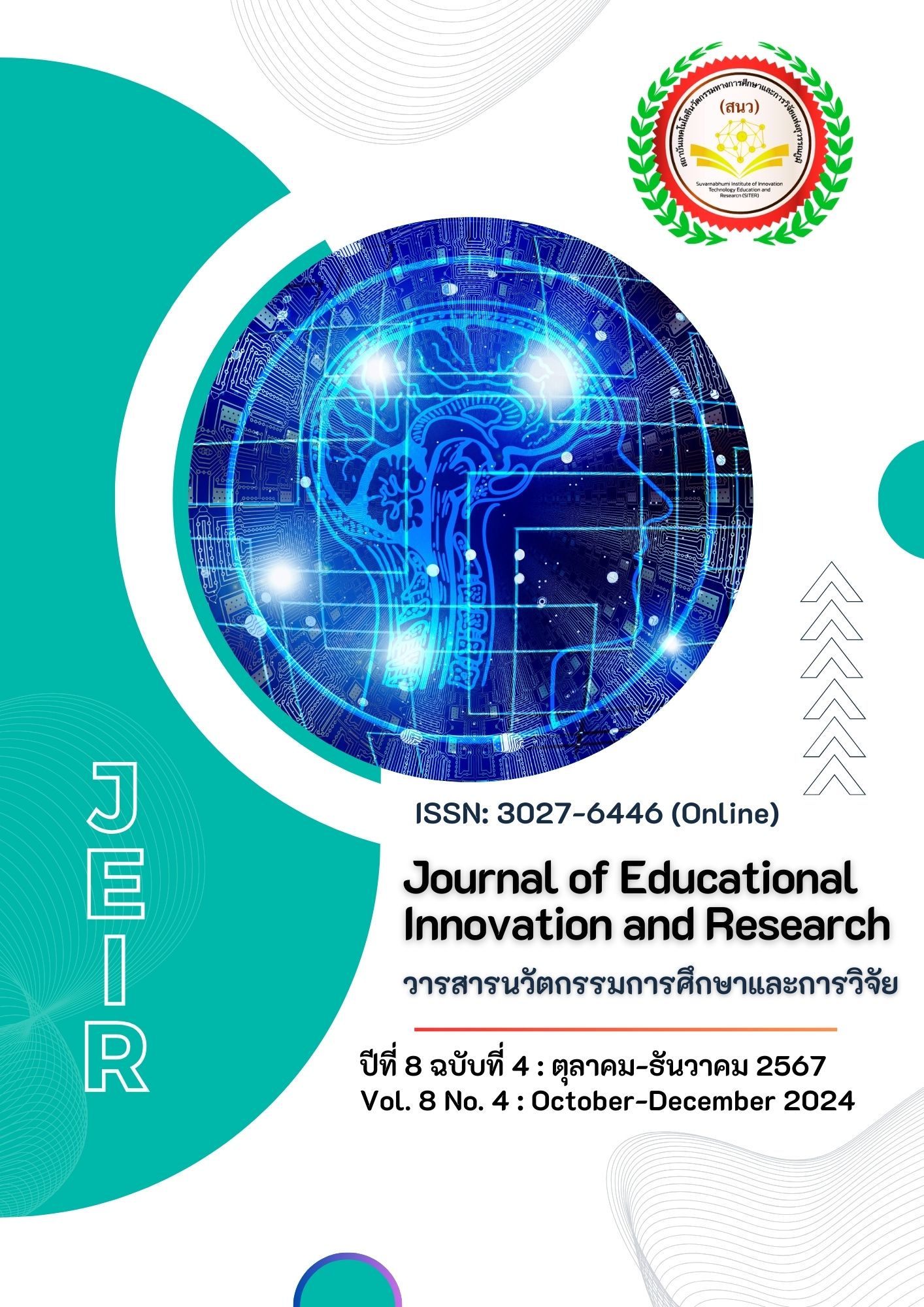A Cogenerative Dialogues among Pre-service STEM Teachers on Nurturing a Culturally Responsive Learning Environment for Effective STEM Classrooms and Reflexive Practices on Thai Sociocultural Issues Classroom
Main Article Content
บทคัดย่อ
In this study, we investigated five pre-service STEM teachers’ cogenerative dialogues during the STEM teaching method course. A cogen was conducted to understand the challenges faced by participants when they are learning how to teach STEM in K-12 schools. During the course, we intend to introduce cogen as a pedagogical tool to pre-service STEM teachers to cultivate a democratic, equitable, and student-centered classroom. We adopted a hermeneutic phenomenological approach to describe and interpret participants’ lived experiences as a learner. We audiotaped and transcribed our interviews and cogen with participants. Data analysis through qualitative content analysis. Several themes emerged from the vignettes, including traditional teacher identity in Thailand, students’ fear of expressing themselves, and STEM education as an opportunity for cultural change. We can see that certain aspects of the Thai sociocultural context create some challenges for STEM teaching and learning: In the Thai sociocultural context, the role of the teacher is often dominant in the classroom setting. This culture's effect on teaching and learning STEM. From the findings, STEM teachers in Thailand need to shift their teaching style to a student-centered approach. By nurturing a democratic classroom culture and promoting autonomous thinking, adding reflective thinking, and providing students with an opportunity to share their ideas. Fostering a democratic culture in STEM classrooms through regular
co-generative dialogues allows students and teachers to get effective STEM classrooms.
Article Details

อนุญาตภายใต้เงื่อนไข Creative Commons Attribution-NonCommercial-NoDerivatives 4.0 International License.
เอกสารอ้างอิง
Duschl, R. A. & Osborne, J. (2002). Supporting and promoting argumentation discourse in science education. Studies in Science Education, 38, 39–72.
Faikhamta, C., Ketsing, J., Tanak, A. & Chamrat, S. (2018). Science teacher education in Thailand: A challenging journey. Asia-Pacific Science Education, 4(1), 1-18.
Geelan, D., Gilmer, P. J. & Martin, S. N. (2006). Dialogue about dialogue—cogeneration, research and science education. Cultural Studies of Science Education, 1, 721-744.
Gladstone, J. R. & Cimpian, A. (2021). Which role models are effective for which students? A systematic review and four recommendations for maximizing the effectiveness of role models in STEM. International Journal of STEM Education, 8(1), 1-20.
Graham, S. (2021). The relationship between culture and the learning and teaching of English: A North-Eastern Thailand perspective under a socio-cultural lens. PASAA: Journal of Language Teaching and Learning in Thailand, 61, 111-146.
Gupta, P., Correa, J., Bueno, M. & Sharma, J. (2014). Using cogenerative dialogues in an informal science institution. In Transforming Urban Education (pp. 355-375). Brill.
Higgins, J. & Moeed, A. (2017). Fostering curiosity in science classrooms: Inquiring into practice using cogenerative dialoguing. Science Education International, 28(3), 190-198.
Hutton, C. (2019). Using role models to increase diversity in STEM. Technology and Engineering Teacher, 79(3), 16-19.
Kennedy, T. J. & Odell, M. R. (2023). STEM education as a meta-discipline. In Contemporary Issues in Science and Technology Education (pp. 37-51). Cham: Springer Nature Switzerland.
Ketsing, J. & Roadrangka, V. (2010). A case study of science teachers’ understanding and practice of inquiry-based instruction. Kasetsart Journal of Social Sciences, 31, 1-16.
Next Generation Science Standards. (2013). Science and engineering in the NGSS. National Academy Press.
OECD. (2009). Teaching practices, teachers’ beliefs and attitudes. In Creating effective teaching and learning environments: First results from TALIS (ISBN 978-92-64-05605-3).
Patton, M. Q. (n.d.). Phenomenology and heuristic inquiry. In Qualitative research and evaluation methods: Integrating theory and practice (4th ed., pp. 190–198). Sage Publications, Inc.
Prabjandee, D. (2019). Unwelcome truths of the professional learning community policy in Thailand: Teacher's sensemaking. Issues in Educational Research, 29(1), 223-242.
Promboon, S., Finley, F. N. & Kaweekijmanee, K. (2018). The evolution and current status of STEM education in Thailand: Policy directions and recommendations. In Education in Thailand: An old elephant in search of a new mahout (pp. 423-459).
Rahmawati, Y. & Koul, R. (2016). Fieldwork, co-teaching and co-generative dialogue in lower secondary school environmental science. Issues in Educational Research, 26(1), 147-164.
Roehrig, G. H., Kruse, R. A., & Kern, A. (2007). Teacher and school characteristics and their influence on curriculum implementation. Journal of Research in Science Teaching, 44(7), 883-907.
Tobin, K. (2006). Learning to teach through co-teaching and cogenerative dialogue. Teaching Education, 17(2), 133-142.
Tobin, K. (2012). Sociocultural perspectives in science education. In B. J. Fraser, K. Tobin & C. J. McRobbie (Eds.), Second handbook of science education (Vol. 1, pp. 3-18). Springer International Publishing.
Tobin, K. & Roth, W. M. (2006). Getting started with cogenerative dialogues. In Teaching to learn (pp. 81-108). Brill.
Tobin, K., Zurbano, R., Ford, A. & Carambo, C. (2003). Learning to teach through co-teaching and cogenerative dialogue. Cybernetics & Human Knowing, 10(2), 51-73.


